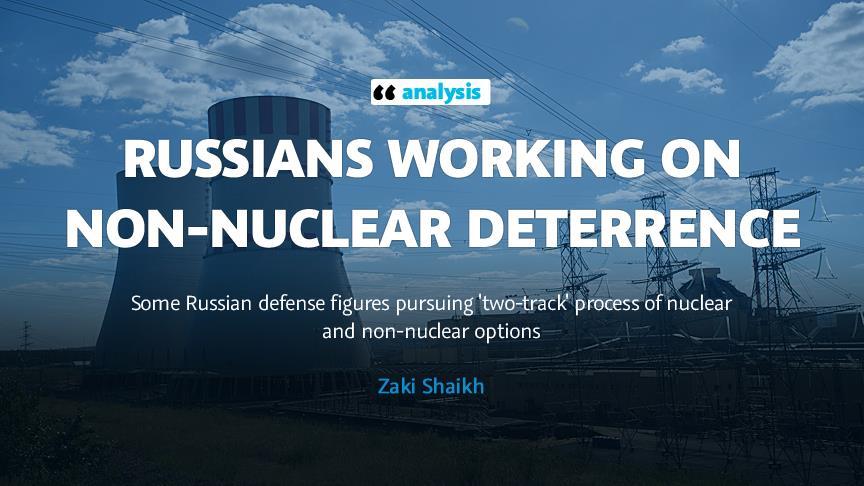Russians working on non-nuclear deterrence
Some Russian defense figures pursuing 'two-track' process of nuclear and non-nuclear options

By Zaki Shaikh
LONDON
The advances in precision bombs have allowed Russia to use its nuclear weapons option as part of a tactical bargaining.
Recent efforts for modernizing and upgrading their defense capabilities have led Russia to develop bombs which are both precise and sophisticated.
However, some experts, such as Konstantin Sivkov, continue to advocate pursuing a two-track approach for developing and maintaining strategic nuclear forces while also bringing strategic non-nuclear-capabilities to a new qualitative level, the Russian Defense Industry Courier reported on Sunday.
Russian Defense Minister Sergey Shoigu has hinted that recent advances might enable Russia to alter its strategic calculus, thus opening up prospects for a bargain on nuclear weapons.
Pursuing such an option would allow Moscow to approach its deterrence dynamics differently and may provide them more maneuverability to pursue nuclear balance, in relation to the U.S. and NATO more
In recent months, Russia demonstrated the use of Kalibr cruise missile, describing them as “highly effective, high precision weapons that can be equipped with conventional or special
The Russian Defense Industry Courier quoted Shoigu saying: "By 2021, the combat capabilities of Russian strategic non-nuclear forces will more than quadruple, which will provide the opportunity to solve the issue of non-nuclear deterrence, as in four years ships and submarines with cruise missiles will constitute the basis for the formations of the carriers for
Shoigu’s remarks were taken from a Jan. 12 lecture in which he declared that in future, precision weapons could serve as a factor of strategic deterrence, replacing a reliance on nuclear power.
Ruslan Pukhov, director of Moscow’s Strategy and Technology Analytical Centre, told Russian Defense Ministry’s Zvezda TV channel that Russia may not prefer to load nuclear warheads on its long-range bombs because it is pursuing more effective options.
Pukhov pointed out that the option of advanced non-nuclear weapons can boost Russia’s defensive and offensive offers.
Following the display of caliber missiles in Syria, Russia has pursued development of X-101 cruise missiles, which they claim have far more accuracy and destructive power, the RU-SMI website reported on Saturday.
These missiles can be transported on a Tupolev Tu-95 turboprop strategic bomber and missile carrier aircraft which can carry up to 24,000 kilograms in rocket weight for a minimum distance of 5,500 kilometers (3,100 miles), the source added.
Russian sources have also boasted about the X-101’s capability to assume lower visibility, thus deceiving radar detection, reported RU-SMI.
Moscow’s Nezavisimaya Gazeta quoted General Sergey Karakaiva on Friday as saying that the share of new missile systems was at 26 percent among the overall missile arsenal and would continue to grow. The newspaper also quoted Defense Minister Shoigu, stating the armed forces had delivered 41 new ballistic missiles, which modernized the nuclear arsenal by up to 60 percent.
Shoigu has recently suggested that in future it will be possible to make a gradual shift from the option of
Russia is seeking to combine precision-guided weaponry with modern sensors,
Those recent developments may enable Russia to carry out precision, low-yield-strikes when and where necessary.
Referring to the steps that should be taken to reduce physical threats to Russia’s security, Foreign Minister Sergey Lavrov reminded the media in Moscow January 17 to “keep in mind absolutely all factors that influence strategic stability”.
Lavrov added that besides nuclear weapons there were many factors weighing in which include “strategic conventional weapons, including hypersonic weapons that can destroy targets in any part of the world within an hour even without nuclear warheads. Those who have these weapons do not need nuclear weapons”.
Lavrov went to name the Ballistic Missile Defence (BMD) system as the second factor which is changing the strategic balance: “We need to negotiate this
Lavrov also pointed to “the space militarization plans of the current and previous U.S. administrations” as well as to “the U.S.’ refusal to ratify the Comprehensive Nuclear Test Ban Treaty” as factors “influencing global strategic balance and parity”.
Lately, Russian defense forces decided to pursue the path of increasing combat effectiveness to an extent to allow them to exchange the nuclear trump card in favor of advanced non-nuclear weapons that are potentially more powerful, the RU-SMI website reported Saturday.
*Opinions expressed in this piece are the author’s own and do not necessarily reflect Anadolu Agency's editorial policy
Anadolu Agency website contains only a portion of the news stories offered to subscribers in the AA News Broadcasting System (HAS), and in summarized form. Please contact us for subscription options.







